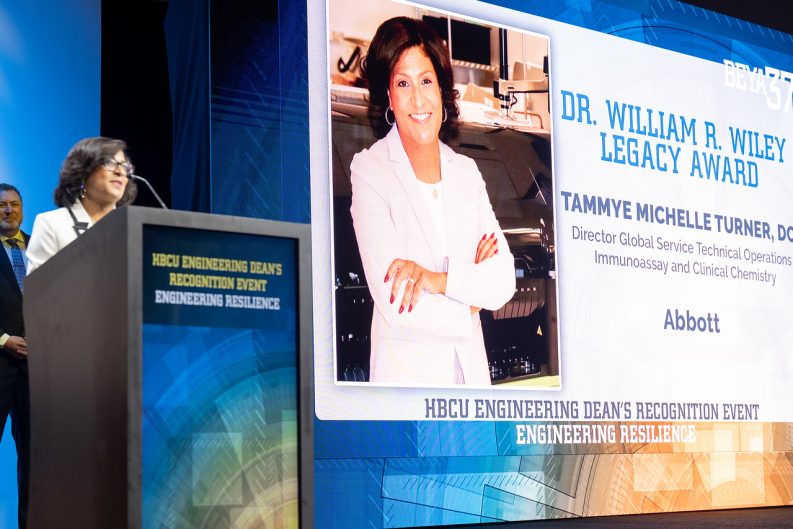 Subscribe
Subscribe- Login
-
/
Sign Up
|
Getting your Trinity Audio player ready...
|
David Harding, Abbott’s global director of technical operations (seen in the background) came from Australia to present the William R. Wiley Legacy Award to Tammye Michelle Turner at the BEYA Conference’s 2023 Historically Black College and University (HBCU) Engineering Deans Recognition Event. The award honors scientists whose work has made a lasting contribution to the workplace and the development pipeline.
“I have known Tammy for seventeen years,” Harding said. “Both as a colleague and friend,” he added. “Tammy serves as the director of an immunoassay and clinical chemistry lab in the global service technical operations. She is the first African American to hold this position. She also holds a doctorate in chiropractic and has previously managed a hospital hematology laboratory. In addition, Tammy is a role model and a mentor for young students seeking a career in STEM. Both her qualities as a leader and her influence among women and minorities and anyone considering a STEM career are exemplary.”
When Tammy was eight years old, she was given a microscope for Christmas.
“I would go around my house to prick my family members on the finger with a safety pin to get blood to put on a slide, so I could look at the blood cells under the microscope,” she told the audience during her acceptance speech. “At that point, all my friends and family knew I would pursue a STEM career. My mother always taught me to go after my dreams. My entire career has been a blessing and destiny, and it is truly a humbling honor to receive an award of this caliber. I want to thank my community, family, husband, and two children for a support system that has helped me thrive to historic heights,” she said.
The story of William R. Wiley, the 1994 Black Engineer of the Year, was featured in the book Twenty Years at the Top: Black Engineers of the Year, published by Career Communications Group. Below is an excerpt from the article that first ran in US Black Engineer magazine’s 1994 conference issue.
As a boy in Mississippi, Wiley had dreams of becoming a doctor. He realized at an early age that this vision could only be achieved through education. Wiley graduated from Tougaloo College with a degree in chemistry.
After serving in the U.S. Army, he attended the University of Illinois Urbana-Champaign under a Rockefeller Foundation scholarship. At Illinois, he received his master’s degree in microbiology in 1960. He then went on to obtain a doctorate in bacteriology from Washington State University in Pullman.
He started his career with Battelle in 1965 as a research scientist at the Pacific Northwest Laboratory. In 1979, he was promoted to director of research and occupied that position until 1984, when he became laboratory director. Responsible for the business operations of Battelle’s Pacific Northwest Division, PNL became a major center for science and technology in the northwest.
“The national labs have an existing research infrastructure that is ready to contribute advanced technologies for the seven or eight new industries that will be the basis of future economic growth,” said Wiley in an interview following his participation in President Clinton’s fall 1992 economic summit.
As the principal executive in the Northwest for the Battelle Memorial Institute, Wiley supervised more than 4,000 scientists, engineers, and technical specialists doing research in support of Department of Energy missions in the environment, energy, defense and national security, economic competitiveness, and education. The lab also participated in the 30-year, $1-billion per year cleanup of the Hanford site.
Wiley was the first national laboratory director to be a member of the Council of the Government-University-Industry Research Roundtable, which reports directly to the presidents of the National Academies of Sciences and Engineering and the Institute of Medicine. As an award presenter at last year’s Black Engineer of the Year Awards conference, Wiley saw firsthand its benefits to the Black community and the country at large.
“The real value of the Black Engineer of the Year Awards,” he said, “is the impact that it must have on students and young professionals starting their careers in large corporate organizations. The conference is important to the country because it promotes visible demonstrations of how diversity in the workplace contributes to companies and communities.”


